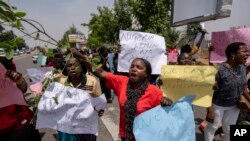Nigerian opposition groups have called Saturday's presidential election a "sham" that should be overturned as their supporters protested in the capital. The electoral commission says ballots show ruling party candidate Bola Ahmed Tinubu in the lead.
About 100 protesters, mostly women and youth, chanted as they held up placards less than 600 meters away from the national collation center in Abuja.
Barricades set up by security forces blocked them from getting closer to the venue where Nigeria's Electoral Commission, INEC, announced the results of last weekend's presidential elections for a third day.
As of late Tuesday, INEC had announced full results from two-thirds of Nigeria’s 36 states. The candidate for the ruling All Progressives Congress or APC party, Bola Ahmed Tinubu, led the race with more than seven million votes.
Tinubu was followed by Atiku Abubakar of the People’s Democratic Party, who had over six million votes, and Peter Obi of the Labor Party, with more than five million.
But protesters like Moses Paul say the results have been manipulated.
"The results collation is fraudulent, it's false because we have seen many cases where people are disenfranchised," said Paul. "INEC materials arrived late in many places where thousands of people had already left, ballots were snatched, certain political groups told other political groups to get out."
The election was marked by widespread delays, operational issues with the voting machines, violence and coercion in some areas.
Many observers including the EU mission have said the voting lacked transparency and fell below expectations.
On Monday, ten political party representatives walked out of the collation center after calling for the vote count to be suspended, alleging irregularities and discrepancies.
INEC refused to do so. Supporters of the ruling APC also protested in Abuja saying INEC must be allowed to complete the process.
"INEC has done well in the process," said Lawal. "If you had such evidence, audio-visual evidence, of violence, of distortions, it's too minute to affect the outcome of this election."
This is the first time INEC has used the Bimodal Voter Accreditation System in a national election.
The system, in theory, allows for real time monitoring and uploading of results from the polling units to INEC's server, but in most cases that did not happen.
European Union chief observer Barry Andrews spoke to VOA Monday about the mission’s preliminary observations.
“The technology that promised so much did not meet expectations," said Andrews. "There were significant problems about uploading results, there were problems with BVAS facial recognition and recognition of fingerprints. There was lack of security in the configuration of polling booths, so, unfortunately, this sort of undermined the trust and the integrity of the electoral session."
Final results from the presidential and parliamentary elections are not expected for at least another two days.
As more results are announced, experts say tensions may increase across Nigeria.





